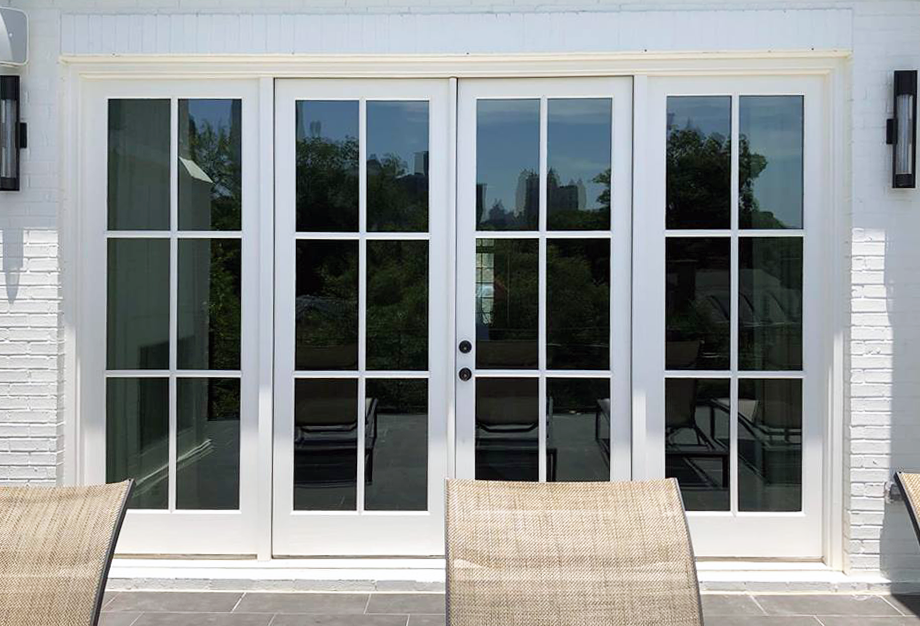Residential Window Tint: The Eco-Friendly Remedy for Your Home
Residential Window Tint: The Eco-Friendly Remedy for Your Home
Blog Article
Just How Residential Home Window Tinting Boosts Your Home's Power Effectiveness
Residential window tinting presents an engaging remedy for homeowners looking for to improve energy performance within their living rooms. By applying specialized movies to home windows, it effectively decreases heat transfer, consequently maintaining interior temperatures and decreasing the need for extreme heating or cooling.
Understanding Window Tinting
Comprehending window tinting is important for home owners looking for to boost both convenience and energy performance in their living rooms. Residential Window Tint. Window tinting entails the application of a slim film to the inside or outside surface area of glass windows. This movie can substantially regulate the quantity of sunshine and warmth that gets in a home, hence influencing interior climate conditions
There are different types of window tinting films available, each with distinct buildings. Colored movies take in solar energy, while reflective movies disperse it away from the glass surface. Ceramic films supply an equilibrium of exposure and heat rejection, making them a preferred option among property owners. The effectiveness of home window tinting is usually gauged by its Visible Light Transmission (VLT) portion, which shows just how much light can pass with the film.
Advantages of Energy Efficiency
Home window tinting not only improves aesthetics however also plays a substantial function in improving power effectiveness within household areas. By decreasing warmth transfer via home windows, colored films create a much more stable indoor climate, which can cause significant reductions in power consumption for heating & cooling. This energy performance equates right into lower energy costs, offering homeowners with considerable long-lasting cost savings.

In addition, home window tinting boosts the convenience of living areas. By decreasing glow and blocking harmful UV rays, tinted windows create an even more pleasurable atmosphere, which can bring about enhanced well-being for owners. The security against UV rays also helps maintain furniture and floor covering from fading, contributing to the longevity of family items.
Just How Tinting Works
Tinting movies operate through a mix of innovative materials and technologies made to regulate the amount of solar energy going into a home. Primarily composed of polyester, these films usually include metal or ceramic bits that mirror and absorb warm. This twin ability permits them to dramatically decrease the infiltration of ultraviolet (UV) rays and infrared radiation while permitting visible light to pass through.
The efficiency of home window tinting is measured by its solar warm gain coefficient (SHGC), which indicates how much solar power is sent through the window. Lower SHGC values are more suitable as they signify better warm rejection. In addition, window colors can feature a range of tones, permitting property owners to tailor their visual preferences while enhancing power performance.
Furthermore, these films function as an obstacle, stopping heat loss during chillier months by mirroring indoor heat back right into the space. This thermal insulation effect matches the air conditioning advantages obtained throughout warmer months, adding to a balanced indoor climate year-round. By handling solar power successfully, residential window tinting not just enhances convenience but also plays an important function in decreasing energy usage and reducing utility costs.
Choosing the Right Tint

There are different kinds of home window films offered, consisting of go to this website colored, metalized, and ceramic. Ceramic movies supply superb heat control without compromising exposure and are very durable, making them a prominent option.
Noticeable light transmission (VLT) is an additional vital variable, as it shows the quantity of natural light that can dig this go through the colored glass. Home owners need to pick a tint with a VLT that matches their illumination preferences while still supplying ample glare reduction.
Additionally, assessing the solar heat gain coefficient (SHGC) can help identify exactly how well a tint can block heat from sunshine. A reduced SHGC shows far better warmth control, ultimately enhancing energy efficiency.
Installation and Maintenance Tips
Correct setup and upkeep are important parts in optimizing the advantages of household home window tinting. Professionals additionally use specialized techniques and tools, which can boost the sturdiness and effectiveness of the color.
Complying with installment, upkeep is important to extend the life of the home window movie. It is advised to wait at the very least 30 days prior to cleaning the tinted windows to allow the adhesive to treat completely.
Resolving these concerns immediately can stop more damages and preserve energy efficiency. By sticking to these setup and maintenance tips, homeowners can guarantee their window tinting continues to give substantial energy savings and convenience for years to come.
Final Thought
Finally, residential home window tinting serves as an effective remedy for boosting energy performance within homes. By minimizing warm transfer and blocking dangerous UV rays, home window movies add to reduce energy consumption and boosted interior convenience. The selection of ideal tinting products, together with correct installation and upkeep, even more optimizes these benefits. Inevitably, home window tinting represents a sustainable investment that not only decreases utility expenses but also promotes a comfortable living setting throughout the year.
Window tinting entails the application of a thin movie to the interior or exterior surface of glass home windows. By lowering warm transfer with windows, colored films create a more steady indoor climate, which can lead to considerable reductions in energy consumption for home heating and air conditioning.The performance of window tinting is gauged by its solar warmth gain coefficient (SHGC), which suggests exactly how much solar energy is transferred with the window. By handling solar power effectively, residential home window tinting not just boosts convenience but additionally plays an important role in minimizing energy usage and reducing energy expenses.
By decreasing warmth transfer and obstructing dangerous UV rays, home window movies add to Read Full Article decrease energy consumption and improved interior convenience.
Report this page